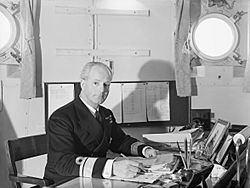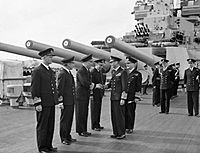Irvine Glennie facts for kids
Quick facts for kids
Sir Irvine Glennie
|
|
|---|---|

Rear Admiral Glennie on board HMS Tyne when Rear Admiral (Destroyers), Home Fleet
|
|
| Born | 22 July 1892 |
| Died | 8 September 1980 (aged 88) Lymington, Hampshire |
| Allegiance | |
| Service/ |
|
| Years of service | 1905–1947 |
| Rank | Admiral |
| Commands held | HMNZS Achilles New Zealand Division HMS Hood Senior British Naval Officer, Western Atlantic |
| Battles/wars | World War I World War II |
| Awards | Knight Commander of the Order of the Bath |
Admiral Sir Irvine Gordon Glennie KCB (22 July 1892 – 8 September 1980) was a Royal Navy officer who went on to be Commander-in-Chief, America and West Indies Station.
Educated as an officer cadet at the Royal Naval College, Osborne, and the Royal Naval College, Dartmouth, Glennie joined the Royal Navy in 1905 and served in the First World War in the Home Fleet and in the Grand Fleet. He joined the Staff at the Royal Naval College, Dartmouth in 1922 and then commanded Destroyers from 1925. He was appointed Flag Captain commanding HMNZS Achilles and Chief of Staff to the Commander-in-Chief of the New Zealand Division in 1936 before becoming Commander-in-Chief of the New Zealand Division in 1938.

He also served in the Second World War as Flag Captain commanding HMS Hood and Chief of Staff of the Battle Cruiser Squadron from 1939; it was in this capacity that he took part in the Attack on Mers-el-Kébir in July 1940. He then served as Commander of Destroyers in the Mediterranean Fleet from 1941, taking part in the Battle of Crete and preventing Axis troops from landing on that island in May 1941, before becoming Commander of Destroyers in the Home Fleet from 1943. He was made Senior Naval Officer, Western Atlantic, at Admiralty House, across the Great Sound from the Royal Naval Dockyard in the Imperial fortress colony of Bermuda, from 1944; this role evolved into Commander-in-Chief, America and West Indies Station in 1945 (which it had been previously until the Royal Naval establishment in the western Atlantic had been subordinated to the United States Navy with the entry of the United States into the Second World War, when control of the Atlantic had been divided between the Royal Navy in the East and the United States Navy in the west). He welcomed President Harry S. Truman to Bermuda after the War and retired in 1947.

